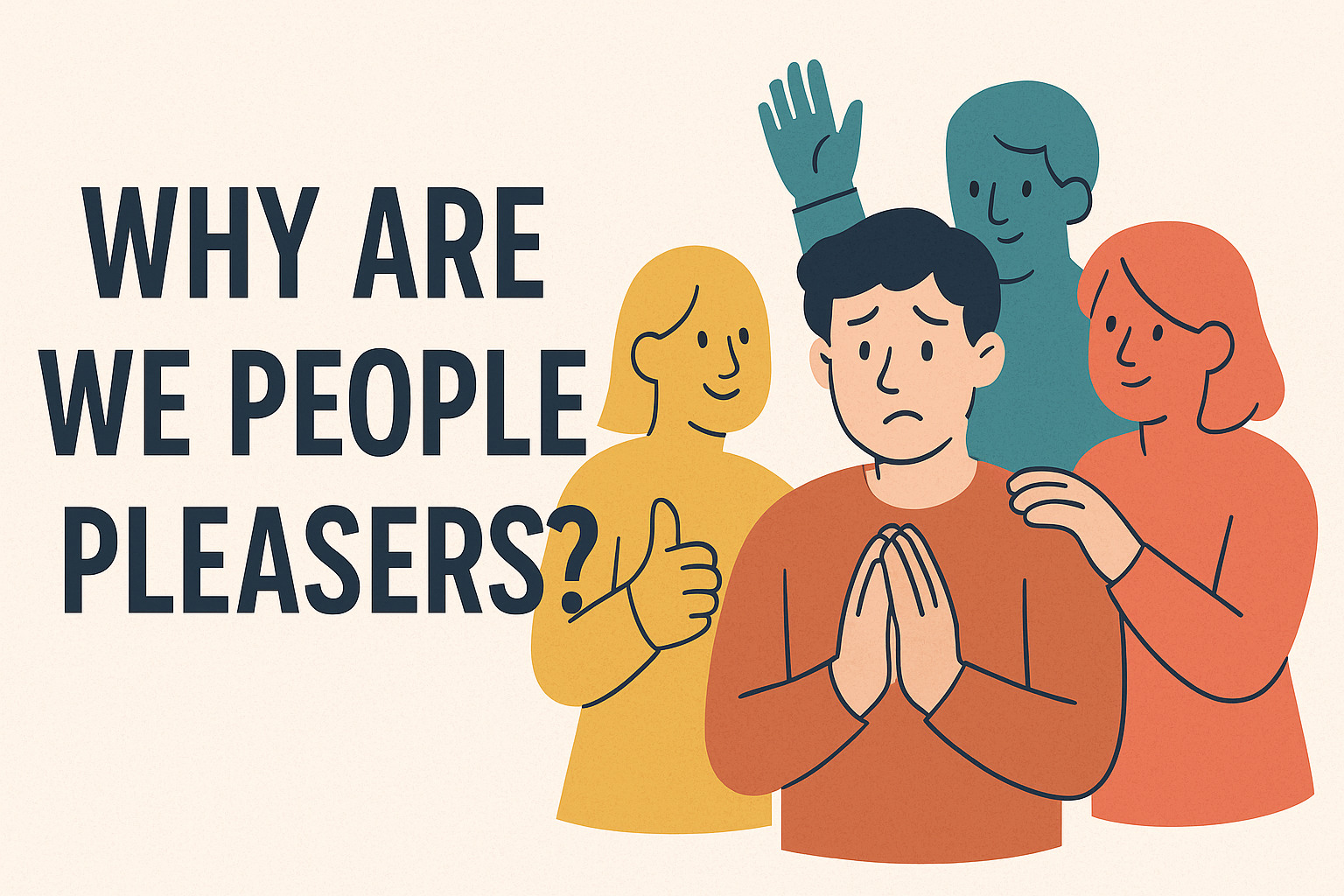Introduction
Have you ever said “yes” to a request you wanted to decline, just to avoid disappointing someone? Or found yourself apologizing for something that wasn’t your fault? If these scenarios sound familiar, you might be a people pleaser. This behavior, while often rooted in kindness, can sometimes harm your well-being. In India, where family, community, and tradition hold immense value, people pleasing can be especially common. But why do we do it? What drives us to prioritize others over ourselves, and what are the consequences? In this blog post, we’ll explore the reasons behind people pleasing, its benefits and drawbacks, and how Indian culture shapes this behavior. By understanding these dynamics, you can take steps toward a healthier balance between kindness and self-care.
Key Points
- People pleasing involves prioritizing others’ needs over one’s own, often driven by low self-esteem or fear of rejection.
- Indian cultural norms, like respect for elders and collectivism, may amplify people-pleasing tendencies.
- While it can foster social harmony, excessive people pleasing may lead to burnout and mental health issues.
- Understanding these behaviors can help individuals set healthier boundaries.
What Is People Pleasing?
People pleasing is the tendency to prioritize others’ needs, wants, or feelings over your own, often to gain approval or avoid conflict. It goes beyond simple kindness, involving a pattern of self-sacrifice that can compromise personal well-being. According to therapist Erika Myers in a Healthline article, people pleasing involves “editing or altering words and behaviors for the sake of another person’s feelings or reactions.” In Indian culture, this behavior is often amplified by societal norms that emphasize family harmony and respect for elders, making it a complex interplay of psychology and tradition.
Reasons for People Pleasing
People pleasing is driven by a mix of psychological and cultural factors. Let’s break down why this behavior develops, with a focus on how Indian culture plays a role.
Psychological Reasons
Low Self-Esteem: Many people pleasers tie their self-worth to others’ approval. They may feel they need to be liked to be valuable, leading to constant efforts to please others.
Fear of Rejection: A fear of being rejected or abandoned can drive individuals to avoid conflict at all costs, even if it means suppressing their own needs. Therapist Lalitaa Suglani notes in a Hindustan Times article that “we fear being alone and that being alone means we’re inadequate or unlovable.”
Childhood Experiences: People pleasing often begins in childhood. Psychologist Dr. Nicole LePera, cited in a Times of India article, suggests it can stem from emotional neglect or inconsistent parenting, where children learn to prioritize others to feel secure.
Cultural Factors in Indian Society
Indian culture, with its rich traditions and societal norms, can amplify people-pleasing tendencies. Here are key cultural influences:
Respect for Elders: Indian society places immense value on respecting elders, often expressed through gestures like Pranāma (bowing to elders). This respect can translate into pleasing elders, even at personal cost.
Family-Centric Culture: The joint family system, where multiple generations live together, often prioritizes family needs over individual desires. This can lead to people pleasing to maintain harmony, as noted in Wikipedia’s overview of Indian culture.
Social Hierarchy: Traditional hierarchies, including the caste system, create dynamics where individuals may feel compelled to please those of higher status, whether in families or workplaces.
Collectivism Over Individualism: India’s collectivist culture emphasizes group harmony over individual needs. This can foster people pleasing as a way to avoid standing out or disrupting the group.
Patriarchal Society: As highlighted in a Vogue India article, “From childhood, women are taught to be submissive and ‘adjust’ more than men,” making women particularly susceptible to people pleasing due to patriarchal norms.
These factors create a cultural environment where pleasing others is often seen as a virtue, but it can come at a significant personal cost.
Benefits of People Pleasing
While often viewed negatively, people pleasing can have some advantages:
Stronger Relationships: By prioritizing others’ needs, people pleasers are often seen as kind and reliable, fostering stronger bonds with family, friends, or colleagues.
Social Acceptance: Pleasing others can lead to greater acceptance in social or professional circles, as people appreciate the effort to accommodate them.
Reduced Conflict: Avoiding confrontation by pleasing others can maintain peace, especially in close-knit communities or families.
In Indian culture, these benefits align with values like hospitality and community, making people pleasers valuable contributors to social harmony.
Disadvantages of People Pleasing
Despite its benefits, excessive people pleasing can have serious drawbacks:
Burnout: Constantly prioritizing others can lead to physical and emotional exhaustion. People pleasers often take on more than they can handle, leaving little time for self-care.
Loss of Identity: Over time, people pleasers may lose sight of their own desires and identity, struggling to know what they truly want.
Resentment: Feeling taken advantage of or unappreciated can lead to resentment, straining relationships.
Mental Health Issues: Chronic people pleasing is linked to anxiety, depression, and low self-esteem. A Talkspace article notes that this behavior can be particularly harmful for women, who are often socialized to prioritize others.
These disadvantages highlight the importance of recognizing and addressing people-pleasing tendencies to protect mental health.
Wish to overcome your people pleasing habit, check out the Boundaries by Henry Cloud and John Townsend.
People Pleasing in Indian Culture: Examples
Indian culture provides numerous examples of how people pleasing manifests in daily life. Here are some specific scenarios:
Arranged Marriages: In many arranged marriages, individuals may suppress their own desires to please their spouse or in-laws, prioritizing family harmony over personal happiness. This reflects the cultural emphasis on family unity.
Family Expectations: Young adults often face pressure to pursue careers chosen by their parents, such as engineering or medicine, rather than their own passions. This can establish a lifelong pattern of people pleasing.
Social Obligations: During festivals like Diwali or family gatherings, individuals may feel compelled to participate in traditions or host elaborate events, even if it’s stressful, to avoid disappointing others.
Workplace Dynamics: In hierarchical workplaces, employees may overextend themselves to please bosses, taking on extra tasks or working late to gain approval, as common in India’s competitive job market.
Parenting and Children: As noted in the Times of India article, children in Indian families are often taught to obey elders without question, fostering people-pleasing behaviors from a young age. For example, a child might be encouraged to follow a parent’s career choice over their own interests.
These examples illustrate how cultural norms in India can reinforce people pleasing, often starting in childhood and continuing into adulthood.
Conclusion
People pleasing is a complex behavior driven by psychological factors like low self-esteem and cultural influences like India’s emphasis on family, respect, and collectivism. While it can foster social harmony and acceptance, the costs—burnout, resentment, and mental health challenges—are significant. In Indian culture, where community and tradition are paramount, people pleasing is often seen as a virtue, but it can lead to neglecting one’s own needs.
Understanding why we are people pleasers is the first step toward change. By recognizing these patterns, individuals can set healthier boundaries and prioritize self-care without guilt. Resources like therapy or self-help books, such as those available on Amazon or other online or offline marketplaces, can support this journey. Ultimately, balancing kindness with self-respect leads to a more authentic and fulfilling life.
Key Citations:
People Pleaser: Signs and Tips
Reasons why you may identify as a people-pleaser
How people-pleasing develops in young children?
As a people pleaser, I was constantly deprioritising myself
How Does People Pleasing Negatively Affect Your Mental Health?
Disclaimer: At mindyou.in, we believe in transparency and trust. Some of the links on our website are affiliate links, which means we may earn a small commission—at no additional cost to you—if you make a purchase through them. These commissions help us continue providing valuable content and recommendations. Rest assured, we only promote products and services that align with our values and that we genuinely believe will benefit our community.

